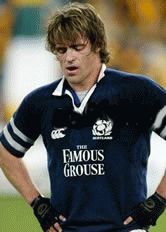From almost as soon as he was appointed, Williams had targeted this trip to form the backbone of all his long-term plans for the development of Scottish rugby.
It has been a hard slog for Scotland, but it was all of Williams' own choosing with six fixtures in less than a month, 46 players included, two separate squads and no few logistical headaches.
But its purposes for Williams were clear. He needed to forge a 'Club Scotland' mentality, a spirit of togetherness which would infuse performances and invoke a self-belief in an inexperienced squad.
With that basis, he explained, fine-tuning the areas of Scotland's game which still need serious work - the missed tackles and the composure in attack - promises to be a far-easier task.
But reaching that platform meant taking risks, exposing raw talent to the international arena and taking on World Cup finalists Australia with an inexperienced Test side emerging from a disastrous Six Nations campaign.
Williams said: "We saw the Australia tour as a blessing and a necessity.
"We said, let's get the rugby principles into a group of 40-50 players, let's get those principles down into the the professional teams and Under-19s.
"We needed a tough tour like this. It was fraught with danger because there was so much unknown but today, at the end of it, I couldn't have wished for more.
"The goals we set as far as identifying players and lifting the national team to another level - those are massive statements - we have achieved."
The success in development over the last month has been unqualified with the likes of Chris Cusiter, Ally Hogg, Sean Lamont, Hugo Southwell, Craig Hamilton and Graeme Morrison emerging from a thumping 41-5 defeat to Queensland as the future of Scottish rugby.
Williams continued: "When we get the injured players back like Gavin Kerr, Andy Craig, Chris Paterson - all of a sudden we have got 35 players we didn't have six months ago.
"We have got experience, we are a bit hungry and there are senior players looking over their shoulder.
"Simon Taylor might even have to look over his shoulder with Ally Hogg. Simon is an outstanding player but Ally's performances on this tour have been world class.
"And Chris Cusiter. He was a colossus yesterday. When we came on this tour we potentially had one or two British Lions candidates, now we have four or five."
But hardened critics, frustrated by too many false dawns in Scottish rugby, will continue to point a harsh finger at Williams for glossing over the key problem areas.
After all, he has not yet delivered consistent results and for all the talk of 18-month or four-year plans, a win is a win and without any Williams will struggle to see his project through to completion.
His only Test victory in eight attempts came over Samoa in Wellington on June 4 in what was an impressive, confident display against a side ranked alongside Scotland.
But when it came to the Wallabies, Williams' men, brave and committed, were found wanting as the age-old Scottish problem resurfaced - they simply could not score tries.
In the first Test, Scotland defended like it was Bannockburn; in the second Test they grew in ambition and creativity but could not thrust home the bayonet, too often lacking the courage of their convictions and missing crucial tackles as the Wallabies retained the Hopetoun Cup by outscoring Scotland nine tries to one over the series.
The workrate statistics, though, are double what were recorded in the Six Nations and Williams is confident those areas will be improved upon now the players realise that with clinical execution and a water-tight defence they might have had a shot at turning Saturday's 34-13 defeat into a victory.
Williams added: "The first thing about a winning habit is believing you can win and playing in a manner that provides the victory in a Test match arena.
"Last night, we played like we believed we could win. We weren't in awe of our opponents, we didn't allow them to set the agenda - we set the agenda.
"We didn't score the points required and that is extremely disappointing.
"It is getting a culture of trusting yourself. When Australia got into the 22, they did not leave without getting points - three or five or seven.
"It is an education for the players, an issue of maturity within the team. We missed tackles and dropped passes but that will come with experience and practice.
"It was so uplifting and fulfilling but frustrating and heartbreaking because we didn't deserve that scoreline."
From Sporting Life











